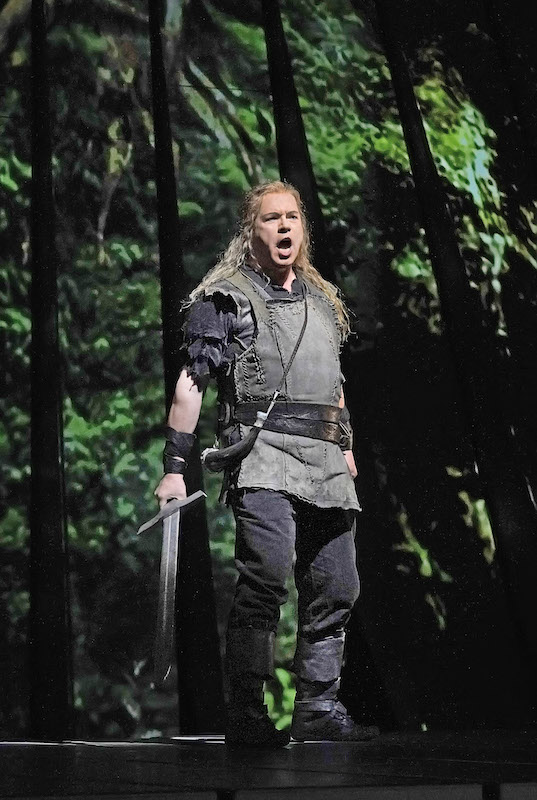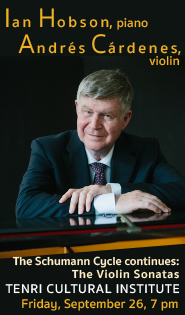Vinke and an unbeatable cast find light in the darkness of Met’s “Siegfried”

Stefan Vinke made his Metropolitan Opera debut Saturday in the title role of Wagner’s “Siegfried.” Photo: Ken Howard
The Metropolitan Opera’s revival of its controversial 2011 Ring cycle, staged by Robert Lepage, reached the 75% mark Saturday afternoon with the opening of Siegfried. The much-debated concept and cost of the production often obscure the fact that it is a conventional staging in every way—quite solid but nothing out of the ordinary.
As was the case in its first go-round, it is the thrilling music-making that distinguishes this production. And, with a superior cast and a great Wagner ensemble in the pit, Siegfried proved that rare thing, a completely satisfying experience, both musical and dramatically.
Siegfried is Stefan Vinke, who was making his Metropolitan Opera debut Saturday. The German tenor has sung the role at something close to two dozen open houses around the world, as well as performing other lead roles in other Wagner operas.
That resume says he’s a heldentenor, the vaguely defined “heroic” tenor that by tradition is essential to Wagner. It requires a unique kind of performer, with stamina and projection, singing one of the most physically arduous roles in all of opera. Siegfried’s music always conveys the character’s otherworldly power and demeanor. While most heroes overcome their fears, Siegfried literally does not know what fear is and that odd immaturity, more than anything, makes him a hero.
Siegfried is an innocent, and also arrogant and insolent, and that characterization was strong in all of Vinke’s singing with Mime (tenor Gerhard Siegel) and the Wanderer (baritone Michael Volle).
Vinke sounded heroic, like Siegfried should. His middle range took some time to open up in the first act, and in the last scene in Act III, with Brünhilde (soprano Christine Goerke), there was often a stertorous bluntness to his attacks. He does have to be heroic, and Vinke was that throughout, singing with passion and charisma, nearly always expressing a feeling of striding over mountains.
And he often sang with great beauty. In the gentlest music his phrasing and sound were graceful and burnished. He was at his best when interacting with other characters, mercurial and full or energy.
Like Vinke, Siegel is a leading exponent of his role, and he was superb. His light, warm tone may on paper be out of place for Mime, but he did so much with his acting, in phrasing and shading. Siegel brought a masterful fluidity to his language and moods, as in Act II where he argues with his brother, Alberich (bass-baritone Tomasz Konieczny), tries to sweetly manipulate Siegfried, and then, due to the magic of the dragon’s blood, sings the truth of his intentions out loud.
Siegel made a superb pairing with Volle. His voice is lighter than one is used to in this role, but his range of expression and sense of depth and experience were incisive and meaningful. One suspends disbelief when dwarves, demigods, and dragons are singing about magical things, but Volle’s Wanderer was real through and through.
His performance in Act III was the most dramatic part of Saturday’s performance. Volle countered mezzo-soprano Karen Cargill’s noble Erda with a mix of frustration, world-weariness, resolution, and satisfaction. And his confrontation with Siegfried had the same breadth, beginning with a determination that had one convinced that he desperately hoped to maintain the reign of the gods.
Goerke was equal to all the others. Her voice had plenty of power and was beautiful, rounded and full, with an expressive shape to all her sustained notes. While not the same kind of innocent as Siegfried, she does have to overcome her own fears of worldly love and its consequences, and Goerke built this transformation so smoothly that she seemed to glide across the enormous emotional chasm of Act III from warning Siegfried away to, in the final triumphant moments, joining him to sing “light-brining love and laughing death!”
The excellence continued in the smaller roles. Konieczny had a marvelous, flat-edged darkness to his tone, and bass Dmitry Belosselskiy had a huge, bottomless sound as Fafner, even without the artificial reverb used to make him sound like a dragon. Soprano Erin Morley had a beautiful coloratura sound as the Woodbird.
Conductor Phillippe Jordan led a brilliant performance from the orchestra. The pace was always right, so natural that one barely noticed things like shifting tempos. The balance between the orchestra and singers was well-managed throughout, and individual moments, like Siegfried’s horn playing, the ominous tuba solo that opens Act II, and the gorgeous forest murmurs, were gripping.
The playing of the Met Orchestra was fresh and energetic throughout, and so captivating in the preludes that it overcame the irritation of Lepage’s machine, which clanked like a freight elevator doing its best to distract the audience from the music.
Siegfried will be repeated May 2 and May 9. metopera.org 212-362-2000


